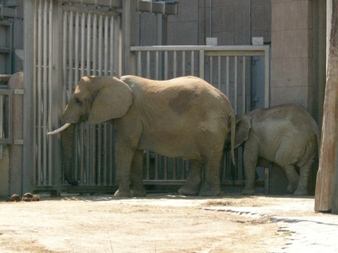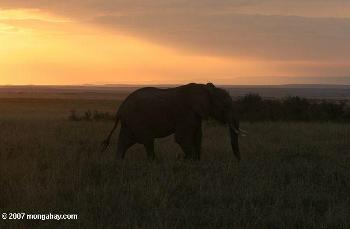Elephants die significantly earlier in zoos than in wild
Jeremy Hance, mongabay.com
December 11, 2008
|
|
A new study from Science provides disturbing evidence that one of the zoos’ most popular animals, the elephant, faces a far shorter lifespan in captivity than in the wild. The findings raise new ethical and scientific questions regarding the rightness of keeping elephants in captivity and the causes of their shorter life-spans.
Comparing female African elephants in Amboseli National Park, Kenya and those in captivity, the researchers found that the wild elephants had a median lifespan of 56 years while captive elephants’ median lifespan was only 16.9 years, excluding statistics on still and premature birth. Wild African elephants therefore live on average three times as long as those in captivity.
 An African elephant and calf in a European zoo. [Image courtesy of Born Free Foundation / Chris Draper] |
When moving onto Asian elephants, the researchers did not choose a wild population to compare with zoos. Instead, they looked at the life-spans of female elephants working in the Burmese logging industry. “We used them because they met our criteria,” Dr. Georgia Mason, who worked on the study, told Mongabay.com, “good access to food and water; protected from hunting; population self sustaining i.e. not reliant on capture from the wild to stay stable in number—thus a reasonable 'reference' or 'benchmark' against which to assess whether zoos are doing as well as they should be. We also had access to a good dataset on them (nearly 3000 females)”.
 Timber elephants of Myanmar. [Image courtesy of K. Mar] |
For Asian elephants the findings for zoos only slightly improved. Median life-spans of Asian elephants kept in zoos were 18.9 years. In contrast the elephants working in Burmese logging industry lived over twice as long: 41.7 years. In addition, infant mortality rates more-than-doubled in zoos. Only 42 percent of offspring from a female’s first pregnancy survived in zoos, while 83 percent of infants survived birth in Burma.
The reasons for the shortened life-span in zoos are probably complex. In captivity, health problems for elephants are common, including herpes, tuberculosis, arthritis, obesity and lameness. Reproductive issues like infertility and infanticide are an additional issue. Elephants likely suffer psychologically in zoos as well. As highly intelligent and wide-ranging animal, elephants are probably more vulnerable to the deleterious affects of captivity than other animals. Some zoo elephants display stereotypic behavior, i.e. repeating the same steps and motions over and over—a clear sign of distress.
There are a number of organizations which are fighting for improved treatment of elephants in zoos, and in some cases to keep elephants out of zoos entirely. Zoo proponents often argue that the popular and charismatic animal bring in additional visitors, and allows them to learn about conservation both in relation to elephants and in general.
 Wild African elephant in Kenya. |
A week ago, the Los Angeles city council ordered a halt to a controversial new elephant exhibit due to these very issues. Currently, the zoo possesses only a single male Asian elephant with the new 3.6 acre pen the zoo had planned to bring in mates for the male. While the city council has halted construction, the exhibit has not been officially cancelled and may still go-ahead as planned.
CITATION:
Ros Clubb ,Marcus Rowcliffe, Phyllis Lee, Khyne U. Mar, Cynthia Moss, Georgia J. Mason. Compromised Survivorship in zoo elephants. 12 December 2008 Vol 322 Science.